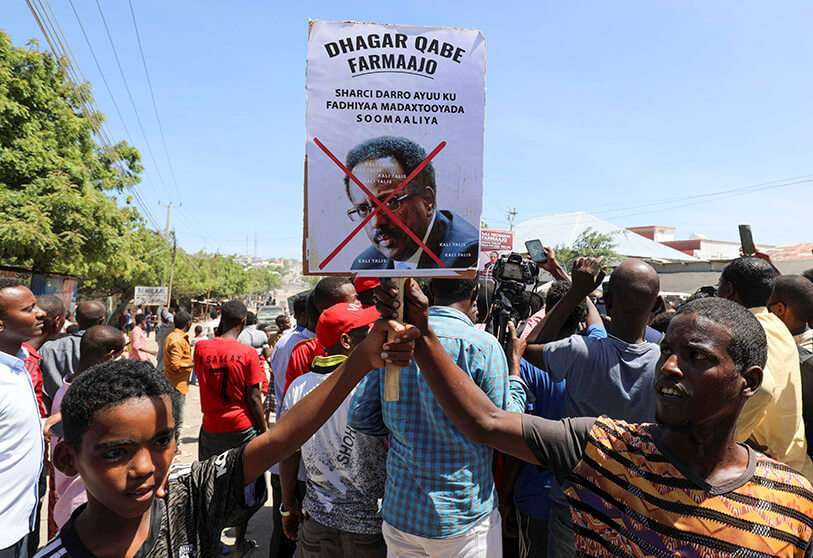Political crisis raises fears of the worst in Mogadishu

Since 26 April, Mogadishu has remained calm but, according to local media, both forces loyal to Mohamed Abdullahi Mohamed and those supporting the opposition continued to occupy strategic positions, particularly in the areas of Fagah and Sana in the north of the city, and many citizens have fled their homes for fear of violence. The deployment of militias loyal to opposition leaders in parts of Mogadishu on 26 April marks a new escalation in Somalia's political crisis, which has a long history of violence. Armed militias and vehicles equipped with machine guns took up positions in opposition strongholds in Mogadishu, a day after an exchange of fire with Somali security forces during a demonstration by opposition supporters against the extension of the mandate of President Mohamed Abdullahi Mohamed, known as "Farmaajo". Sporadic gunfire, heard throughout the night, appeared to have ceased. However, barricades were erected in some areas and residents fled, fearing further clashes.

Somalia is, after South Sudan, the most violent country in Africa and the sixth most violent in the world, according to the 2020 Global Peace Index. And, considering that South Sudan has been immersed in a peace process for the past year, and that there is no sign of substantial improvement in the situation in Somalia in the short term, it is very likely that the State of the Horn of Africa will unseat the young South Sudan from this ignominious first continental position. The country remains mired in a spiral of violence that has been difficult to contain since the spike in violence that took place between 2013 and 2014. This violence has traditionally been perpetrated by Al-Shabaab, an Al-Qaeda-related terrorist group whose activity is centred in the regions around the Somali capital, Mogadishu. Somalia's problem, however, is not exclusively violence, which is just one more consequence of a deeper problem: the political disintegration that the country has suffered for decades and which makes it a perfect example of a failed state.

President Farmaajo's four-year term expired on 8 February without elections. The opposition, which has considered Farmaajo's authority illegitimate since 8 February, denounced it as a ploy by the president and his allies to stay in power. The decision to extend his mandate puts Farmaajo in direct opposition to influential and armed political rivals, but also to Western powers that support his fragile government. On 12 April, parliament voted to extend the mandate of the president and his government for two years, pending presidential and parliamentary elections. The extension, which was signed into law by the president, was deemed unconstitutional, especially by the president of the Senate, whose chamber was unable to examine the text.
Days before the end of the mandate, urgent meetings were called with regional leaders in an unsuccessful attempt to reach an agreement that would allow the elections to be held. The president tried to put himself forward as an interim candidate, but the parliament did not approve it, arguing that it was unconstitutional to extend his government, even temporarily. This resolution is a breach of the 17 September agreement, which has not only angered opposition leaders, powers and international organisations, but has generated violence and division within the Somali armed forces.

This political crisis stems from the continuing disagreement between Farmaajo and the leaders of Puntland and Jubaland, two of Somalia's five semi-autonomous states, over the holding of elections. Farmaajo's rivals in Puntland and Jubaland are allied with a powerful coalition of presidential aspirants and opposition heavyweights in Mogadishu, including two former heads of state and the Senate president. These opponents claim that the extension of the presidential mandate, which they consider "null and void", compromises peace and stability in Somalia. This threat is all the greater given that several of Farmaajo's enemies are clan militia leaders.
Other prominent figures have publicly disagreed, such as the Mogadishu police chief. He was dismissed after attempting to shut down parliament before the 12 April vote, which he publicly denounced as an attempt to seize power. Analysts fear that the poorly paid and heavily armed security forces are divided along political and clan lines, raising fears of a return to deadly street clashes in Mogadishu.

The UN had warned that the international community, which is keeping Somalia afloat financially, would not tolerate a further postponement of the elections or extension of the mandate. The European Union has also spoken of "concrete actions" if election talks are not resumed. Much more forceful was the African Union, which in a late-breaking communiqué called the political stalemate and the delay of elections a way of "undermining the unity and stability of the country" and urged "an immediate resumption of dialogue on the basis of the September 2020 Agreement".
Following this loss of support for Farmaajo, the international community expressed its support for the demands of the prime minister and regional leaders. On 28 April, Farmaajo bowed to pressure from the opposition and the international community and announced that he was refusing to extend his mandate for two years. In his speech, Farmaajo said he would address parliament on 2 May to seek its support for the electoral process. He also urged state security forces to maintain the stability of the Somali capital, Mogadishu, and the safety of the civilian population.
Regardless of whether Farmaajo continues as president of Somalia for the next two years, preparations for the elections must begin as soon as possible and to this end, regional authorities, opposition leaders and the government must continue to negotiate on the reform of the electoral system. Given previous experiences over the past year, and the non-recognition of Farmaajo's extended mandate as president by some local and regional authorities, it appears that the parties have reached a real impasse in the negotiations.









